Статьи журнала - Economic and Social Changes: Facts, Trends, Forecast
Все статьи: 1553
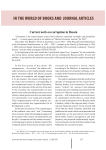
Current work on corruption in Russia
Статья научная
“Corruption is the system feature of post-Soviet Russian capitalism (scientific and journalistic notes)” - so much paper, placed in two editions of “Russian Economic Journal” for 20111. The author Yuri Boldyrev, Ph.D. in Economics, was in 1992 - 1993 Head of Control Department of the Presidential Administration, in 1993 - 1995 - member of the Council of Federation in 1995 - 2001 worked as deputy chairman of the Accounting Chamber. He is currently a columnist, “Literary Gazette” and the online newspaper«STOLETIE.RU». At the beginning of the work stated that it specifically argued very “pregnant” for the authorities and society thesis, anyway appearing in all the texts on contemporary Russian author. To solve this problem, in our opinion, the author has succeeded, which greatly facilitated the careful structuring of the article.
Бесплатно
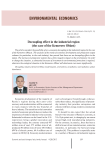
Decoupling effect in the industrial region (the case of the Kemerovo oblast)
Статья научная
The article considers the possibility of eco-economic decoupling in the industrial region (in the case of the Kemerovo Oblast). The analysis of the trends of economic development and production output volumes (in particular, in the coal industry) has proved that there are no decoupling effects in the region. The increase in production volumes has a direct negative impact on the environment. In order to change the situation, a substantial increase of investment in environmental protection is required, otherwise the ecological situation in the Kemerovo Oblast will deteriorate even more significantly.
Бесплатно
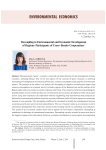
Статья научная
Moving towards “green” economy is currently a priority direction for the development of many countries, including Russia. One of the key aspects of the concept of green economy is achieving decoupling or misalignment of economic growth rates, resource consumption and negative environmental impact. The purpose of the article is to analyze the decoupling of negative environmental impact and resource consumption in economic activity in border regions of the Russian East and the entities of the Baikal region with cross-border economic relations with China. The research novelty lies in identifying the possible impact of cross-border position on environmental and economic development of the areas under review. Long-term experience of cooperation with the neighboring state demonstrates that prospects are followed by environmental problems since the economy of Siberian and Far Eastern regions is consistently focused on raw materials. The decoupling coefficient is calculated to identify the misalignment between economic growth rates and environmental pollution...
Бесплатно
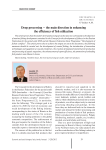
Deep processing - the main direction in enhancing the efficiency of fish utilization
Статья научная
The article proves that the modern level of processing of catches does not correspond to the objectives of marine fishing development contained in the Concept for the development of fishery in the Russian Federation for the period until 2020 and the Russian Federation State Programme “Development of fishery complex”. The article proves that to achieve the targets set out in the documents, the following measures should be carried out: the development of coastal fishing, the introduction of innovation technologies and equipment at coastal enterprises, the creation of integrated enterprises for production and processing of aquatic organisms, the enhancement of export efficiency, the promotion of unloading fish products onto Russia’s shores.
Бесплатно
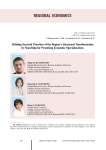
Статья научная
Global crises and foreign trade restrictions imposed on the Russian economy slow down its growth, affecting export-oriented regions to a great extent. Retaliatory economic measures, including those aimed to promote structural transformation of the economy, require its key directions to be defined. We attempt to determine priorities of the structural transformation of the Vologda Oblast economy by searching for promising types of economic activity. For this purpose, we study theoretical foundations of the search for priorities of sectoral development, elaborate and test a methodological approach to the search for promising branches of regional economic specialization, and identify areas of development for potential growth points. Using the materials of the Vologda Oblast, we make a list of activities whose development is promising from the point of view of long-term economic growth and identify potential opportunities for their introduction into the region’s economy. Scientific novelty of our work consists in the development and testing of our own tools for finding priorities for the structural transformation of the regional economy based on identifying promising economic specializations. The information base includes works of Russian and foreign researchers in the field of industrial and spatial development, data from state statistics, the Federal Institute of Industrial Property, scientific electronic library eLIBRARY. ru and regional input-output tables for the Vologda Oblast. The findings of the work can be used in the management of the region’s sectoral and spatial development and in research on the issues under consideration.
Бесплатно
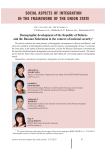
Статья научная
The article considers the main features of demographic development in Russia and Belarus, and shows the similarity of demographic problems and the presence of demographic threats. It examines the state policy in the sphere of human reproduction, and for the Russian Federation it substantiates the necessity of influencing the demographic processes from the viewpoint of national security. The article proves that the Union State countries should unite their efforts for overcoming negative demographic trends.
Бесплатно
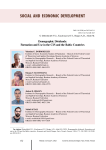
Demographic dividends: formation and use in the CIS and the Baltic countries
Статья научная
The article investigates one of the most pressing problems of the modern world - demographic aging and its impact on demographic security in the CIS. Changes in the age structure are happening on a global scale, and show increasing dynamics. At the same time, demographic aging has significant regional differences. The purpose of the study is to identify general trends, regional differences in population aging in the post-Soviet countries, the formation and use of demographic dividends. When analyzing the second demographic dividend, we propose to apply the term “resource potential of the older generation” that largely determines the capabilities of the aging population. We use the following methods: logical analysis, synthesis, generalization, induction and deduction, a systems approach to the analysis of demographic phenomena, calculations of demographic coefficients used in assessing the age structure, its dynamics and the formation of demographic dividends. The information base of the study includes data of the current accounting of demographic events presented by the Statistical Committee of the CIS, materials of Eurostat, the UN, domestic and foreign scientific publications, as well as materials of own research on the topic of the article. The main results of the work confirm the conclusion that the post-Soviet countries have significant differences in the age structure of their population and the intensity of demographic aging. We determine that the acceleration of the aging process was a general trend in most of them. This brings to the fore the problems associated with the need to form and effectively use the second demographic dividend, which will promote economic welfare of the countries.
Бесплатно
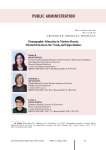
Demographic education in modern Russia: mismatch between the needs and opportunities
Статья научная
Negative trends in major demographic processes, aggravated by the impact of the COVID-19 pandemic, require not only an active demographic policy, but also thoughtful and well-grounded management decisions. This raises the requirements for the qualifications of employees in the field of science, education and management personnel in terms of their understanding of complex and multifactor demographic processes. Consequently, the need for training and retraining of demographers is also increasing. The purpose of the work is to assess the current state of demographic education in Russia and the possibilities of its development. The article presents an overview of foreign and national educational and scientific practice in the field of demographic education. We find that the “Demography” field is included in the enlarged group “3. Social sciences, business and law”; therefore, most educational institutions implement educational programs in the “Sociology” field; more often these are master’s degree programs. Scientific institutions focus on collaborating with educational institutions and pursue an educational and scientific trajectory (for example, the USA); they can also work autonomously by responding to the needs of the state and society (France, Germany). We also review Russian practice of implementing the educational process under the program “Demography”. We find out that only three universities conduct educational activities under this program. However, the scientific and educational potential for training demographers, taking into account “non-core” universities and academic research organizations, is available in the capital and in the regions. Nevertheless, the presence of laboratories specializing in demographic research proves the relevance of demographic knowledge in various regions of Russia. The analysis of departments’ teaching staff confirms their high educational and scientific potential. An overview of the work of scientific institutions and departments at universities indicates that vigorous scientific and research activity in the “Demography” field is being conducted in Russia. The analysis shows that in modern Russia, the issues of standardization of this area of work and education have not yet been fully worked out. We substantiate a system of successive stages for development of an educational standard in the “Demography” field and approval of the “Demographer” professional standard.
Бесплатно
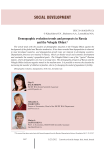
Demographic evolution trends and prospects in Russia and the Vologda oblast
Статья научная
The article deals with the analysis of demographic situation in the Vologda Oblast against the background of the global and Russian tendencies. It has been revealed that depopulation is observed in most developed countries, and depopulation growth rates are reduced in developing countries. Depopulation processes are retained in Russia, which can hinder social and economic development and contradict the country’s geopolitical goals. The Vologda Oblast is one of the “typical” Russian regions, where demographics are close to average ones. The demographic prospects of Russia and the Vologda Oblast indicate negative trends in the medium term. It is possible to reverse the situation by increasing the number of children in families, that is by changing the model of population’s fertility.
Бесплатно
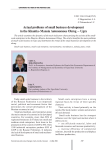
Demographic problems of the republic of Belarus and their solutions
Статья научная
Last year the realization term of the National Program of demographic security of the Republic of Belarus for 2007-2010 was over. The author of the article analyzes the implementation of the program paper from the angle of some certain indices. Some current demographic problems of the country are also considered, short-term and long-term perspectives are estimated. The author suggests some ways for further protection of demographic security of the Republic of Belarus.
Бесплатно
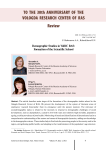
Demographic studies in VolRC RAS: formation of the scientific school
Статья обзорная
The article describes main stages of the formation of the demographic studies school in the Vologda Research Center of RAS. We present the development of the system of thematic areas of employees’ research historically: from its emergence until the present moment. The relevance of sociodemographic topics is related to the necessity to respond to demographic challenges of social development, such as depopulation, caused by low birth rates and relatively high mortality, population ageing, and the prevalence of poor health. Monitoring of trends and identification of determinants lead to a comprehensive understanding of the nature and causes of demographic dynamics, adding new knowledge to the demographic science. These studies help to find tools for preserving people in the country and in the region, strengthening public health, and adapting to the transformation of the population’s age structure. The thematic topic of works covers all demographic processes: birth rate, mortality, marriage and divorce; patterns of the public health development and conditions for the formation of a healthy generation are studied, monitoring and evaluation of the demographic policy effectiveness are carried out. Due to the significance of behavioral factors of demographic development, the research of the population’s demographic behavior is of special importance in the studies. VolRC RAS develops and implements the system of matrimonial, reproductive, self-preservation, and migration behavior monitoring using sociological methods. Despite depopulation, studies on the health formation, first of all, among children are still relevant. At the current stage of Russia’s social development, social status of a family, the level of pedagogical competence and medical activity act as important health determinants together with external socio-economic conditions. The purpose of this work is to review socio-demographic studies which have been conducted by employees of the Vologda Research Center of RAS for the past 30 years.
Бесплатно
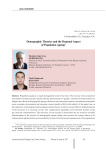
Demographic theories and the regional aspect of population ageing
Статья научная
Population ageing is a major demographic trend of our time. The increase in the proportion and number of elderly people requires that the governments of “ageing” countries develop measures to mitigate the effects of demographic ageing reflected in two interrelated aspects: maintaining sustainable socio-economic development and ensuring a decent quality of life for the elderly. At the same time, as the experience of developed and developing countries shows, in order to ensure effective implementation of the measures it is necessary to take into consideration regularities and territorial features of the age structure transformation. The relevance of our research is determined by the need for scientific understanding of the process of demographic ageing taking into account the system nature of its characteristics (global nature and inevitability in terms of the narrowed reproduction of the population) and the multiplicity of implications for socio-economic development. The aim of our research is to identify the regularities and regional features of population ageing...
Бесплатно
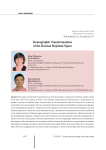
Demographic transformations of the Russian regional space
Статья научная
The paper considers the transformations of the quantitative components of human capital, which is the main driver of economic growth in the material, institutional and mental space. According to the author's concept of stratified space, the processes of self-reproduction and self-renewal of a system are carried out in the material space. This can be determined by the indicators of fertility, mortality and migration in the demographic subsystem. The process of self-regulation of a system on the basis of legislative acts and behavior patterns is carried out in the institutional space. Institutional transformations are also manifested in the implementation of federal target programs for socio-economic development, affecting the state of the demographic subsystem. The processes of self-reflection, self-determination and self-development are carried out in the mental space. Mental transformations in the demographic subsystem are manifested in the change of value orientations...
Бесплатно
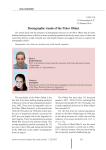
Demographic trends of the Pskov oblast
Статья научная
The article deals with the dynamics of demographic processes in the Pskov Oblast that has been holding leading positions in Russia in terms of natural population decline for many years. It shows the connection between a high mortality rate and health situation and suggests the ways to improve the demographic indices.
Бесплатно
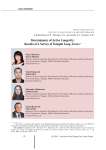
Determinants of active longevity: results of a survey of Vologda long-livers
Статья научная
Population ageing is a major demographic challenge for the majority of developed and developing countries. The implications of population ageing are not reduced to purely economic aspects (increasing the burden on the working population, growing deficit of pension funds) and they lead to a change in people's attitude toward the elderly as a social group, the resource potential of which should be disclosed, the task being of major importance for any “ageing” country. At the same time, a priority of population policy in any country is to increase life expectancy of its citizens. Thus, given the forecast reduction in demand on the labor market and possible raise of the retirement age in Russia, authorities at all levels focus not just on the increase in life expectancy, but on active longevity of its citizens, which is reflected in the maintenance of physical and moral health of man for as long as possible. The paper investigates determinants of active longevity. The first part of the paper provides statistical analysis of prevalence of this phenomenon in various regions of the world and Russia...
Бесплатно
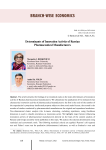
Determinants of innovation activity of Russian pharmaceutical manufacturers
Статья научная
The article presents the findings of an empirical study on the main determinants of innovation activity of Russian pharmaceutical manufacturers. We substantiate the application of two indicators that characterize innovation activity of pharmaceutical manufacturers: the first is the ratio of the number of the organization’s proprietary intellectual property objects to those used under license; the second is the number of studies conducted by pharmaceutical manufacturers for original and reproduced medicines. Two-dimensional cluster analysis (the k-means clustering, excluding repetitions, using Euclidean distances) is used to classify enterprises as innovation-active. We highlight major factors influencing innovation activity of pharmaceutical manufacturers directly on the basis of the content analysis of Russian and foreign scientific works published on this topic. We analyze the selected determinants using statistical and econometric tools. The following statistical criteria are applied: Pearson’s chi-squared test and Fisher’s exact test for qualitative (dichotomous) indicators, as well as Student’s t-test and the Mann - Whitney test to analyze quantitative indicators. Using discriminant analysis of the main determinants of innovation activity of Russian pharmaceutical enterprises we reveal the most significant determinants, primarily those that directly characterize the size of industrial enterprises. Additionally, we prove that widespread processes such as mergers and acquisitions of pharmaceutical manufacturers contribute to the possibility of accumulating resources necessary for innovation development of pharmaceutical manufacturers; however, these processes have certain negative effects associated with an increase in the oligopolization of pharmaceutical markets.
Бесплатно
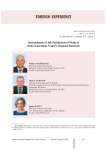
Determinants of job satisfaction of workers from generations x and y: regional research
Статья научная
The paper discusses job satisfaction in the context of different generations of workers and the entry of new representatives in the labor market. The study is both theoretical and applied; it uses materials of quantitative and qualitative research on the issues under consideration. The main source of empirical data is a sociological surveys conducted in 2015 and 2017 according to the method of random non-repetitive sampling among employees of individual enterprises of different forms of ownership operating in Podlaskie North-Eastern region of Poland, and analysis of the data. The goals of our work are to identify the most important organizational factors that influence job satisfaction and to identify differences between the employees from the older generation (X) and the younger generation (Y) at regional enterprises of different ownership forms as objects of functional management. According to four indicators reflecting professional job satisfaction (working conditions, sense of self-worth, possibility of development, relations with other employees), the findings of our study revealed similarities and differences between them in the older and younger generations. Similarity consists in the fact that material results of activity are a priority for both generations of workers. Difference consists in the predominance of pragmatism in the younger generation and conservatism in the older generation. The study is of theoretical and practical importance in the field of professional business management in the region. It indicates what factors are important for the younger generation of workers in the context of achieving job satisfaction compared to the older generation. Therefore, the management of any enterprise should use a variety of management tools to improve the efficiency of its activities, for example, to differentiate the motives that will satisfy different needs and incentives in the work of employees of different age groups.
Бесплатно
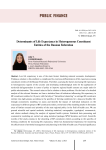
Determinants of life expectancy in heterogeneous constituent entities of the Russian Federation
Статья научная
Low life expectancy is one of the main factors hindering national economic development. Finding a solution to this problem is complicated by enormous differentiation of life expectancy among constituent entities of the Russian Federation. Therefore, assessing the factors increasing life expectancy in heterogeneous regions of the country and developing methodological tools for the application of territorial defragmentation in terms of policy to improve regional health systems are major tasks for public administration. The research aims to find a solution to these problems. On the basis of a detailed analysis of the relevant literature we form a statistical base of indicators influencing life expectancy in RF constituent entities for 10 years; with the help of “hierarchical clustering” we arrange RF constituent entities into eight groups according to the specifics of forming conditions for a long and healthy life; through econometric modeling we assess and identify the impact of individual indicators on life expectancy in different groups of RF constituent entities; on the basis of the modeling results we formulate areas of further research and priorities of the state regional policy in the field of health care. We use general scientific and special methods, including statistical, cartographic, typological, econometric, and cluster methods during the analysis of regional health systems. Statistical data processing and econometric modeling are carried out using statistical packages SPSS Statistics and Gretl. Scientific novelty of the study consists in the clustering of RF constituent entities according to the specifics of forming conditions for increasing life expectancy, which has fundamental importance for improving the effectiveness of territorial management and planning in the field of health care. Practical significance of the work is determined by the tasks of regional policy of Russia and its constituent entities in the sphere of increasing the life expectancy. The results of the study can be useful to the state regional authorities and local authorities for the formation of a set of measures to improve life expectancy.
Бесплатно
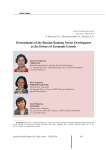
Determinants of the Russian banking sector development as the drivers of economic growth
Статья научная
The paper substantiates the relationship between the situation in the national banking sector and Russia's economy. Using the data provided by the Bank of Russia [8; 9; 10], Federal State Statistics Service [2], IBM SPSS Statistics software product, the authors have carried out a regression-correlation analysis of the main indicators of the Russian banking sector in 2005-2015 and GDP. It has been found that there is the strongest positive correlation between GDP and aggregate banking risks and also the profit of credit institutions; the correlation between GDP and aggregate financial result of the banking sector is weaker; the return on equity has no significant relationship with major indicators of banking activities, except for a moderate negative relationship with the aggregate value of regulatory capital; the return on equity in the Russian banking sector is affected adversely by subordinated debt in the structure of capital. In a stable economic situation (2005-2007, 2010-2013) the authors point out a correlation between capital and the profit of the banking sector; in a crisis situation (2008-2009, 2014-2015), there is a correlation between capital and the profit of profitable credit institutions alone...
Бесплатно
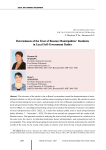
Determinants of the trust of Russian municipalities’ residents in local self-government bodies
Статья научная
The relevance of the article is due to Russia’s orientation toward the democratization of socio-political relations, as well as the need to address issues emerging in modern society. We consider a system of factors determining the level, nature, and dynamics of the trust of Russian municipalities’ residents in local self-government bodies. We provide the findings of the following sociological surveys conducted in the Tver Oblast: 1) a sociological monitoring carried out to analyze the dynamics of citizens’ perceptions of local self-government (2012-2022); 2) a study that analyzes public trust in local self-government bodies (October 7 - November 1, 2022). The data of our research are compared with the results of all-Russian surveys. Our approach consists in analyzing the trust in local self-government as a whole and, at the same time, the trust in its individual institutions (head, administration, and representative body of municipality). This, along with the grouping of trust factors that we put forward, determines the scientific novelty of the work. In the course of the study, we observe a low level of trust in local self-government bodies (compared, for example, with trust in the president), its undulating dynamics, predominance of an increasing trend, tendency toward its depersonalization, and formation of an institutional type of trust. We propose a theoretical and methodological framework for designing a system of determinants of trust in local self-government bodies and identify groups of factors influencing it. We reveal a weak connection of the dynamics of trust in local self-government bodies with the stages of the economic cycle, the importance of the material well-being of citizens as a trust factor; besides, we find that citizens’ trust in local self-government bodies is conditioned by their perception of the economic situation. The factors that have the most significant influence on the growth of the level of trust in local authorities include positive assessment of the work of local self-government bodies, citizens’ positive assessment of their own experience of interaction with local self-government employees, high or average assessment of the degree of influence of an ordinary citizen on the activities of local self-government bodies. Perceptions concerning the presence of corruption in municipal bodies, inconsistency of real municipal practices aimed at minimizing the participation of citizens in managerial decision-making, and people’s expectations have a negative impact on the credibility of this institution. We propose ways to solve these problems. Theoretical significance of the work is determined by the possibility to use the theoretical and methodological framework for further theoretical and empirical research. Practical significance is associated with the possibility of developing state and municipal policy measures aimed at improving ways to increase public trust in local authorities.
Бесплатно

